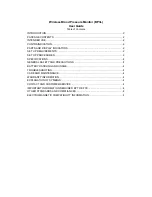
Theory of Operation and System Architecture
126
Chapter 10 - Training Program
Printing is accomplished on 50 mm wide thermal paper at recorder speeds
programmable up to 50 mm/s.
ECG Processing
The technique used in ECG senses the varying potential difference between
two points at the skin surface which respond to the electro-chemical actions of
the muscular activity of the heart.
Three electrodes are attached to the patient’s right arm (RA), left arm (LA)
and left leg (LL). The varying potentials at these locations are cable-
connected to the ECG circuit inputs where they are conditioned, and the
difference of potential between two selected leads is digitized before
transmitting through opto-isolators to the processor. The processor-installed
algorithms operate on the signals to develop drivers for the graphic display
and to compute the heart rate in beats per minute (BPM).
In addition to the acquisition of the QRS waveform complex, the ECG input
and subsequent signal processing computing circuitry perform a number of
other functions:
•
They detect a “lead-off” condition if one of the electrode connections is
disrupted.
•
They detect the presence of pacemaker signals within the QRS waveform
complex of the ECG.
•
They generate a synchronization pulse for external use with
defibrillators. The Defib Sync Pulse output is available at a connector in
the rear panel.
Respiration
Processing
The patient’s respiration is detected by using two of the three leads of the
ECG electrodes and cable. A low-level excitation signal is applied to these
leads, and the variation of the thoracic impedance caused by the breathing is
sensed and processed for display and measurement.
NiBP Processing
The NiBP processing uses an oscillometric technique to provide needed
measurements at selected intervals. This technique uses an inflatable
sphygmomanometer cuff similar to those used by clinicians in routine
measurements.
A motorized pump inflates the cuff to approximately 180 mmHg initially, at
which point the pressure effectively stops the flow of blood. Then, under
monitor control, the pressure in the cuff is gradually reduced, while a pressure
transducer detects the air pressure and transmits the parameter signal to the
NiBP input circuitry.
As the pressure is reduced, blood flows in the previously occluded artery, and
changes the measurements made by the transducer. The point at which
Summary of Contents for M3921A
Page 12: ...xii Contents ...
Page 16: ...Related Documents 4 Introduction ...
Page 48: ...Safety Tests 36 Performance Verification ...
Page 72: ...Troubleshooting Guide 60 Chapter 5 Troubleshooting ...
Page 100: ...Disassembly Procedures A3 88 Chapter 6 Disassembly Guide ...
Page 103: ...Top Level Assembly Chapter 7 Spare Parts 91 Figure 2 A1 Top Level Assembly Drawing 2 of 2 ...
Page 105: ...Top Level Assembly Chapter 7 Spare Parts 93 Figure 3 A3 Top Level Assembly Drawing ...
Page 108: ...Front Case Assembly 96 Chapter 7 Spare Parts Figure 5 A1 Front Case Assembly Drawing 2 of 3 ...
Page 110: ...Front Case Assembly 98 Chapter 7 Spare Parts Figure 7 A3 Front Case Assembly Drawing 1 of 2 ...
Page 111: ...Front Case Assembly Chapter 7 Spare Parts 99 Figure 8 A3 Front Case Assembly Drawing 2 of 2 ...
Page 114: ...Rear Case Assembly 102 Chapter 7 Spare Parts Figure 9 A3 Rear Case Assembly Drawing 1 of 3 ...
Page 115: ...Rear Case Assembly Chapter 7 Spare Parts 103 Figure 10 A3 Rear Case Assembly Drawing 2 of 3 ...
Page 116: ...Rear Case Assembly 104 Chapter 7 Spare Parts Figure 11 A3 Rear Case Assembly Drawing 3 of 3 ...
Page 124: ...Repacking In A Different Carton 112 Chapter 8 Packing For Shipment ...
Page 144: ...Preventative Maintenance 132 Chapter 10 Training Program ...
Page 150: ......













































